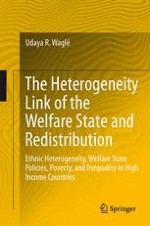2013 | OriginalPaper | Buchkapitel
4. Poverty and Inequality
verfasst von : Udaya R. Waglé
Erschienen in: The Heterogeneity Link of the Welfare State and Redistribution
Aktivieren Sie unsere intelligente Suche, um passende Fachinhalte oder Patente zu finden.
Wählen Sie Textabschnitte aus um mit Künstlicher Intelligenz passenden Patente zu finden. powered by
Markieren Sie Textabschnitte, um KI-gestützt weitere passende Inhalte zu finden. powered by
